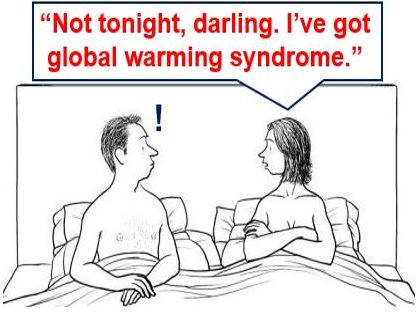Global warming will have a surprising consequence – people’s libido will suffer and sexual intercourse frequency will decline, resulting in a much lower birth rate. Male sperm quality and female ovulation may also be affected. This is what a report from the American private nonprofit research organization – National Bureau of Economic Research – predicts.
So, if the authors’ forecast is accurate, not only will sea levels rise, the incidence of floods increase, and droughts become more frequent, longer-lasting and severe, ‘coital frequency’, as the authors delicately put it, will decline.
According to data gathered and analyzed by the authors (citation below), people may feel less inclined to have sex when temperatures increase. The report refers to the US population only, but the data could be extrapolated for other parts of the world, the authors said.
 During the second half of the 21st century, the notorious ‘headache’ started to give way to ‘global warming syndrome’.
During the second half of the 21st century, the notorious ‘headache’ started to give way to ‘global warming syndrome’.
Super hot days lead to fewer babies
Studies show that nine months after an exceptionally hot day, the birth rate drops significantly – declining by 0.7%, compared to a cooler day.
Either higher temperatures undermine a man’s or woman’s fertility (or both), or reduce their appetite for sexual intercourse. Perhaps both factors are affected, the authors suggest.
According to the researchers:
“Extreme heat leads to a sizeable fall in births. Temperature extremes could affect coital frequency. It could affect hormone levels and sex drives.”
“Alternatively, high temperatures may adversely affect reproductive health or semen quality on the male side, or ovulation on the female side.”
Developing countries may be more severely affected
In an interview with The Independent, co-author Alan Barreca said their conclusions probably also apply to the UK. Global warming, he added, is likely to have an even more severe effect on developing nations.
The Independent quoted Prof. Barreca, who works at Tulane University in New Orleans, who said:
“The decline in birth rates is a very serious issue for countries, like the United States and the UK, which have below-replacement birth rates. This will put a lot of strain on social insurance programs, like social security, because it will create large imbalances in the make-up of the population.”
In a synopsis of the report, the authors wrote:
” The lack of a full rebound suggests that increased temperatures due to climate change may reduce population growth rates in the coming century. As an added cost, climate change will shift even more births to the summer months when third trimester exposure to dangerously high temperatures increases. Based on our analysis of historical changes in the temperature-fertility relationship, we conclude air conditioning could be used to substantially offset the fertility costs of climate change.”
Citation: “Maybe Next Month? Temperature Shocks, Climate Change, and Dynamic Adjustments in Birth Rates,” Alan Barreca, Olivier Deschenes, Melanie Guldi. NBER Working Paper, No. 21681. Issued in October 2015.

